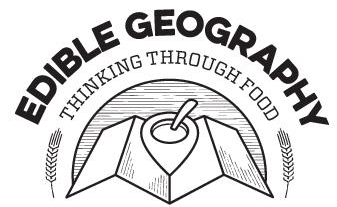
IMAGE: Map created by the NYC Regional Foodshed Initiative of the Urban Design Lab, a joint project of the Earth Institute and Columbia University GSAPP, via Urban Omnibus.
I’m pretty excited to have a feature published on Urban Omnibus today, in their fabulously named “Unseen Machine” series.
Back in February, a week before our first Foodprint Project event, Varick Shute of the Urban Omnibus asked Sarah Rich and I what we hoped we might learn from a multidisciplinary conversation about cities and food. Now that Foodprint NYC has been followed by Foodprint Toronto (with Foodprint LA on the way), Varick kindly invited me to report back on what exactly it is that we have learned, thus far.
As well as the parallels across cities, and the good ideas that each could stand to steal from the other, I tried to include a couple of the many surprises we’ve encountered thus far:
At Studio-X in New York, our jaws collectively dropped as the CEO of Jetro Cash & Carry, purveyor of bulk quantities of chips to New York’s bodegas, issued a passionate plea for radical junk food taxation (“We need to tax the hell out of deep-fried products in this city!”). And I was not the only person taken aback when Toronto’s Senior Health Advisor told us that she’d taken the city’s food purchasing budget of $2 million to the Ontario Food Terminal, determined to demand more locally-grown produce, only to realize she had far too little money to negotiate effectively with the vendors there.

IMAGE: Map and table showing Toronto’s global crop imports in terms of dependence and seasonality, created by University of Toronto students Drew Adams, Fadi Masoud, Denise Pinto, Karen May, and Jameson Skaife. Found via InfranetLab, where you can see a larger version, as well as read more about the students’ proposal.
For more, visit Urban Omnibus — and while you’re there, check out the other fantastic features in their series on the hidden workings of the city, from Roosevelt Island’s pneumatic rubbish tubes to gutter design.
Meanwhile, if you like what you have seen or read of the Foodprint Project, and you’d like to see more events in the future, as well as receive your very own copy of the Foodprint Papers, you have just seven days to help us meet our Kickstarter fundraising goal! A huge thank you to all those who have pledged their support already, as well as helped to spread the word.

